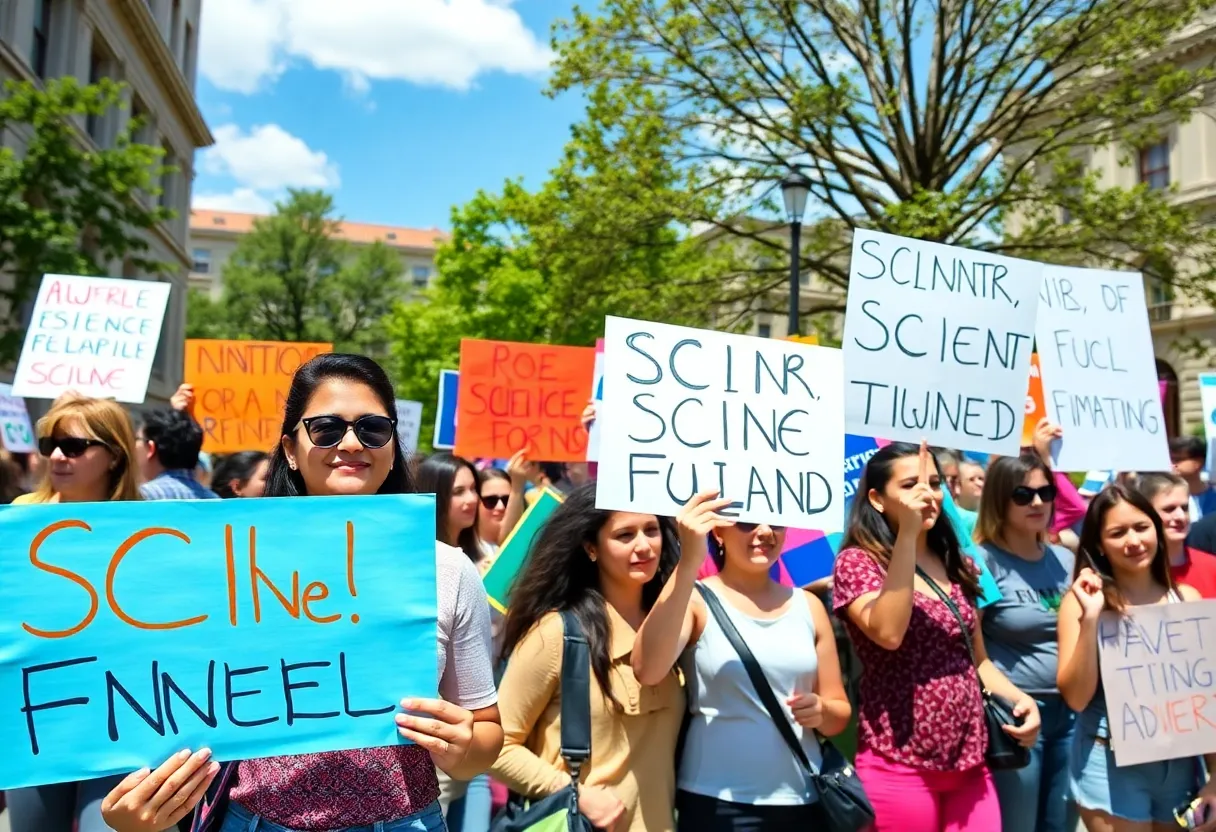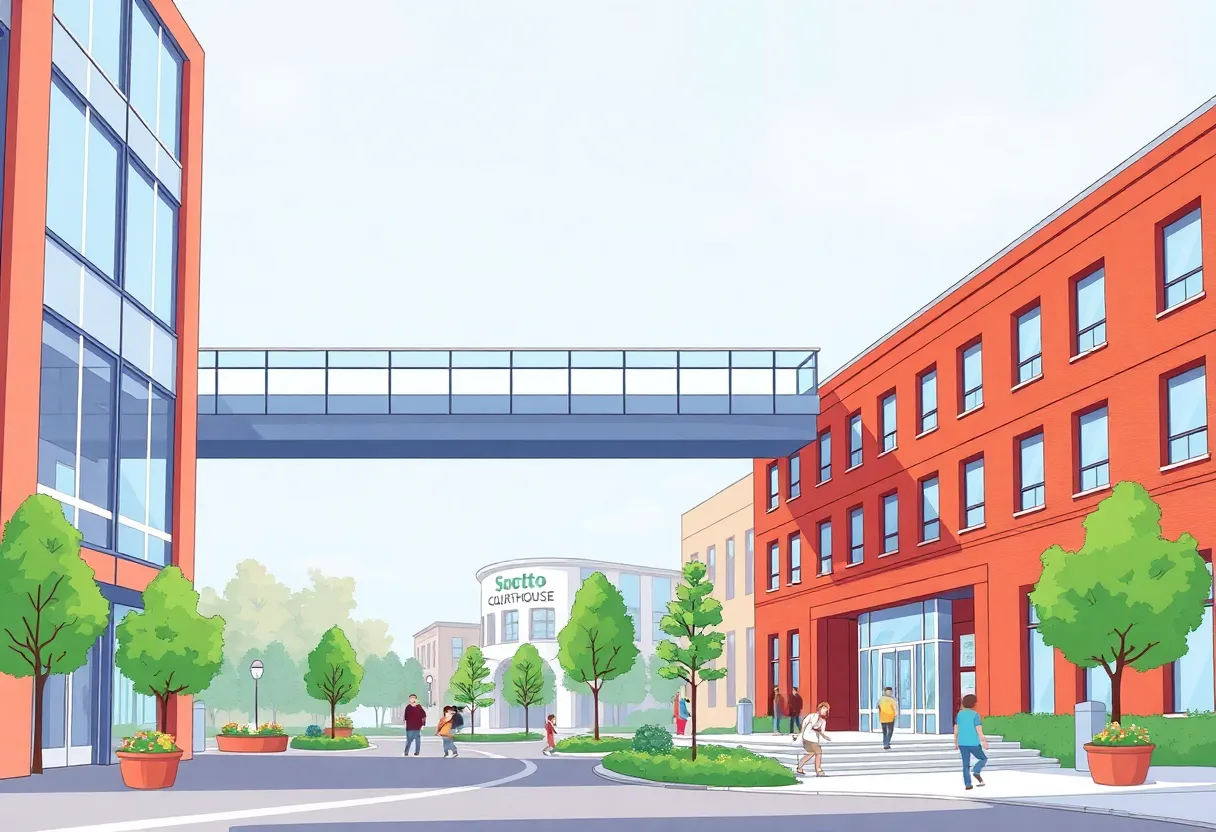News Summary
Students at Texas A&M University gathered to protest cuts to National Institutes of Health funding as part of the ‘Stand Up for Science’ movement. The rally united students across various disciplines, raising concerns over the implication of funding cuts for vital research, especially in light of rising anti-intellectualism. The event highlighted the importance of academic freedom and the need for increased support for scientific inquiry amidst political pressures.
Texas A&M Students Rally for Science Amid National Movement
In College Station, Texas, students at Texas A&M University came together on a sunny Friday afternoon to express their discontent over recent cuts to funding from the National Institutes of Health (NIH). This protest was part of the larger national movement titled “Stand Up for Science” (SUFS), with a simultaneous gathering taking place in Washington D.C., where thousands voiced their concerns.
Grassroots Action Takes Center Stage
The SUFS movement has grown rapidly over the past few years, fueled by grassroots efforts at universities and research institutions across the nation. With a focus on three major goals—ending censorship and political interference in science, expanding scientific funding, and promoting diversity, equity, and inclusion (DEI) within scientific communities—this movement has become a significant force for change.
Protestors Unite for a Common Cause
At Texas A&M, the rally was organized by the Psychology Department Organization of Graduate Students (PDOGS). However, it quickly drew students from various disciplines, including chemistry, engineering, and atmospheric sciences, highlighting how widespread the concern is regarding the piercing cuts to vital research funding.
Voices of Concern
As the rally commenced, Benjamin Schulte, the president of PDOGS and a graduate student in psychology, took an active role in organizing the event. He and many others raised alarms about the impact of capped NIH funding, pointing out that some crucial federally funded projects at Texas A&M—including life-saving cancer research—have either been halted or completely scrapped. It’s not just about the financial aspect; it’s about the contributions to humanity that could be lost.
The Threat of Anti-Intellectualism
Protesters spoke candidly about their frustration with the rising tide of anti-intellectualism in politics. Many expressed concerns about what they perceive as a growing skepticism towards scientific and public health data, particularly frustrating in regard to issues like vaccines and climate change. Such sentiments resonate deeply with many communities that rely on scientific research for evidence-based decision-making.
Broader Implications of Funding Cuts
Some participants voiced more alarming theories, suggesting that the reduction in NIH funding serves a dual purpose—not only trimming government spending but also consolidating power within the executive branch. This viewpoint reflects a broader skepticism towards political agendas that seem to undermine the integrity of scientific research and inquiry.
The Role of Faculty in the Movement
Adding to the dialogue, an associate professor took to the stage, sharing her perspective on how science, truth, and knowledge appear to be at risk in the current political climate. Advocating for evidence-based research, she reinforced the message that the results of scientific inquiry are crucial for the advancement of society and should not be compromised.
Chanting for Change
The rally turned into a vibrant march around Academic Plaza, where participants energetically chanted slogans like “Stand up, fight back — science is under attack” and “Research, progress, innovation — science builds a stronger nation.” Colorful signs adorned the hands of many attendees, with phrases such as “I can’t believe we have to march for science” and “Texas A&M stands up for science” showcasing their determination.
Ending a Day of Activism
As the clock struck 1 p.m., the protest came to a close with participants engaging with curious onlookers. Reactions varied, with some expressing support, while others remained dismissive of the students’ cause. The rally not only served to unify those who participated but also sparked a larger conversation around the importance of academic freedom in an increasingly polarized environment.
The National Context
Adding weight to the students’ concerns, commentary from some bystanders echoed the urgent need to uphold freedom of speech and promote genuine debate amidst rising political pressures. With President Trump hinting that he would cut federal funds from universities that don’t regulate protests, the already heated discourse surrounding academic expression becomes even more crucial. This protest at Texas A&M stands as a clear symbol of student activism, reflecting broader anxieties about the future of scientific funding, research integrity, and the role of evidence in a society that desperately needs it.
Deeper Dive: News & Info About This Topic
HERE Resources
Texas A&M University Faces Backlash Over Drag Show Ban
West Texas A&M University Women’s Soccer Program Faces Transition
Texas A&M University Faces Backlash Over Drag Show Ban
Texas A&M University Takes a Stand for Immigrants
Brazos Valley Cities Receive Major Infrastructure Funding
Texas A&M University Faces Legal Heat Over Drag Show Ban
College Station Approves Historic Fire Services Agreement
Aggie Muster Ceremonies to Honor Fallen Aggies Worldwide
Texas A&M Board Bans Drag Performances Amid Controversy
Texas A&M University-Texarkana Breaks Ground on Athletic Complex
Additional Resources
- KBTX: Texas A&M System Regents Drag Show Ban
- Wikipedia: Texas A&M University
- The Hill: Texas A&M Drag Ban
- Google Search: Free Speech Lawsuits
- CBS Sports: Texas A&M Upsets Auburn
- Google Scholar: NCAA Basketball
- Gig Em Gazette: Texas A&M Baseball Win
- Encyclopedia Britannica: College Baseball
- Sports Illustrated: Jace LaViolette Texas A&M
- Google News: Texas A&M Baseball







